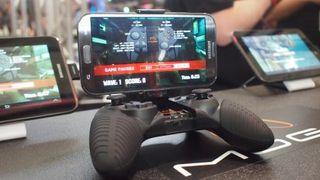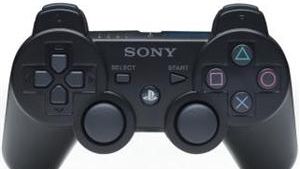Why the smartphone is about to beat the PS4 at its own game
Is smartphone gaming smart gaming?Should the Playstation console itself?
There are certainly benefits to gaming on a phone, but if you truly want to replicate the big screen and controller experience of playing on a console you can potentially do that too.
There are a variety of controllers available that are compatible with, or in some cases even designed specifically for smartphones.

Some of them, such as the Moga Pro controller, include a cradle for the phone so that you can essentially turn your handset into a true handheld console, complete with the necessary buttons and sticks.
Others, such as the Nyko Playpad Pro, are just standard controllers, which don't clip to your phone, so they're no good for gaming on the move, but will be ideal if you stream or output your games to a television or monitor through a dedicated MHL cable or mirroring device.

Some phones, such as the Sony Xperia Z1 and many other Xperia handsets, can even be made to work with Sony's DualShock 3 pad via Bluetooth, giving you the comfort of a familiar controller, though you will need to buy a USB On The Go cable to make the initial connection.
None of these are ideal solutions as a controller is likely to cost at least £15 and in many cases you also need an MHL cable to link your phone to a television which will also cost at least £10 for a half-decent option, while a console comes with everything you need out of the box.
Even once you've got a controller and screen to hand a phone is never likely to fully replicate the console experience. We put big screen gaming to the test with a £20 Moga Mobile Gaming System controller and an MHL cable paired with an HTC One and found that while the experience was reasonable it was no substitute for a home console.
Get daily insight, inspiration and deals in your inbox
Get the hottest deals available in your inbox plus news, reviews, opinion, analysis and more from the TechRadar team.

On a 32 inch screen Asphalt 8 looked a little blurry and lacking in detail, though Dead Trigger 2 fared rather better, almost passing off as a low budget console game.
It's understandable that blowing the games up led to lower quality visuals though, as our chatty Gameloft spokesperson told us "a high-end mobile game may be able to push 30% - 50% of the polygons of current-gen consoles," so it stands to reason that visual quality on a large screen is likely to be 50% - 70% worse.

The controls weren't perfect either. Using a controller was definitely better than a touch screen, but there was slight lag with some inputs due to using a Bluetooth connection.
Worse than that, the games just didn't feel like they'd been designed for a controller as there was none of the precision or smoothness you'd experience on a home console, with jerkiness and stiffness creeping in.
Speaking of consoles though, there's always the likes of the Ouya or GameStick, which are attempts at making an Android powered home console. Laggy performance and a lack of games hold it back, but it points towards a future when smartphone games could be as comfortable on a television screen as on the move.
Can smartphone gaming be as good as console gaming?
The short answer is not yet, but there's a lot of hope for the future. Right now the overall experience of smartphone gaming is not as good as console gaming. Most smartphone games are substantially worse and their touchscreen control schemes are often clunky.
As an alternate way to experience your favourite smartphone games a proper controller and TV output are great options and won't break the bank, but they can't match a dedicated console.
However, certain smartphone games are just about of 'console quality' and there are even a few examples of higher-power games ported to smartphones.

For smartphones to truly match up to consoles they'll need to have more titles brought over at the very least, or better yet have more high profile, high quality exclusives. The Infinity Blade series has made good strides in that area, but few other smartphone exclusives compare.
As phones become more powerful, the games will inevitably be more popular and developers will work out more innovative ways of designing touchscreen controls, so we feasibly could see the phone matching a console mid-way through the life cycle of the PS4.
But currently playing a smartphone game on a big screen requires extra purchases and the experience isn't as slick as it is on a console.
In other words consoles will always have a place in the living room, while smartphones look set to become the gaming system of choice just about everywhere else.
There are still some hurdles for phones to overcome before they reach the same gaming standards as consoles, but phone hardware is improving at a breakneck pace.
Developers definitely believe things will only get better for the smartphone gamer and quickly, with our Gameloft spokesperson stating: "with each advancement that is made on the hardware and software end, the potential for more creative freedom for our developers and a more immersive experience for our fans increases."
Now... back to finally being able to complete Sonic the Hedgehog...
- Just updated: our PS4 review
James is a freelance phones, tablets and wearables writer and sub-editor at TechRadar. He has a love for everything ‘smart’, from watches to lights, and can often be found arguing with AI assistants or drowning in the latest apps. James also contributes to 3G.co.uk, 4G.co.uk and 5G.co.uk and has written for T3, Digital Camera World, Clarity Media and others, with work on the web, in print and on TV.

